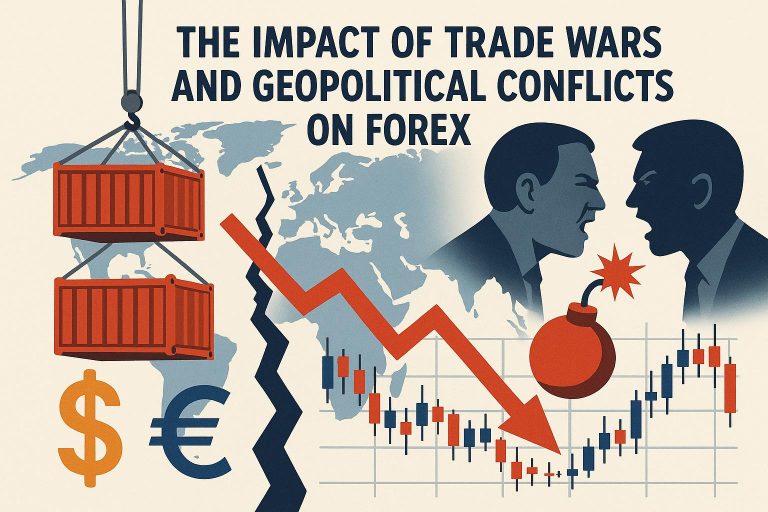The Influence of Trade Wars on Forex Markets
The global foreign exchange (Forex) market is intricately interwoven with international trade dynamics. The interconnected nature of economies means that disturbances in trade policies, such as trade wars, can ripple through and significantly affect the Forex market. Trade wars primarily involve the imposition of tariffs and other trade barriers that have a consequential impact on currency valuations. These economic confrontations can set off a chain of reactions, influencing both demand and supply in the Forex market.
Currency Valuation and Tariffs
Tariffs are a central tool in trade wars that substantially affect currency values. When a nation imposes higher tariffs on imports from another country, it triggers a decline in the demand for those imported goods. Consequently, this leads to a reduced demand for the exporting country’s currency, as fewer transactions are conducted in that currency. This decreased demand can result in currency depreciation for the exporting nation. On the other side, if a country facing tariffs shifts its focus to domestically-produced goods, the demand for its currency might rise, potentially leading to currency appreciation.
Moreover, countries affected by increased tariffs might devalue their currency intentionally to maintain the competitiveness of their exports. This devaluation can further exacerbate fluctuations in the Forex market, as other nations might respond with protective measures or devaluations of their own currencies to stay competitive in the international market.
Capital Flows and Investment
Trade wars introduce a layer of uncertainty in international markets that profoundly impacts capital flows. As uncertainty mounts, foreign direct investment (FDI) tends to diminish. Businesses and investors become cautious, apprehensive about the stability and profitability of new ventures. In countries embroiled in trade disputes, this concern can precipitate capital flight, wherein investors shift their assets to economically and politically stable regions perceived as safe havens.
This reallocation of resources affects the balances of payments and, in turn, the demand and supply of involved currencies. Nations experiencing capital flight often see their currencies depreciate, while those perceived as safe havens or stable destinations for investment might witness an appreciation in their currency values.
Geopolitical Conflicts and Forex Volatility
Beyond trade wars, geopolitical conflicts substantially affect currency stability and the Forex market’s overall dynamics. These conflicts can range from military escalations and territorial disputes to political disagreements and economic sanctions. Such tensions inherently create uncertainty, leading to volatility in the Forex market.
Flight to Safety
During periods of geopolitical instability, investors frequently pursue safe-haven currencies. Currencies like the US Dollar (USD), Swiss Franc (CHF), or Japanese Yen (JPY) are esteemed for their perceived stability and resilience to geopolitical risks. Thus, in turbulent times, these currencies often experience appreciation as global investors flock to them to safeguard their investments from potential downturns. Meanwhile, currencies from nations entangled in conflicts typically face depreciation due to diminished confidence and heightened risk perceptions.
Impact on Commodity Currencies
Geopolitical disturbances can have cascading effects on resource-rich regions, affecting commodity prices and subsequently influencing commodity-linked currencies such as the Canadian Dollar (CAD) or Australian Dollar (AUD). For instance, geopolitical tensions in major oil-producing areas can lead to supply disruptions, affecting oil prices worldwide. Such fluctuations impact the demand-supply equation in commodity markets, culminating in notable currency movements for nations reliant on commodity exports. The interconnectedness of global supply chains means that disruptions in one region can have amplified effects across various economies, influencing Forex trends globally.
Case Study: US-China Trade War
The US-China trade war stands as an emblematic example of how international trade disputes can sway the Forex market. Throughout this economic skirmish, the Chinese Yuan (CNY) witnessed significant fluctuations in response to announcements and implementations of new tariffs. Each escalation in tariffs was matched by the Yuan’s depreciation as the Chinese government sought to counterbalance the impacts, while global perceptions of risk also influenced currency valuations.
Simultaneously, the US Dollar displayed periods of relative strength, primarily as a byproduct of being viewed as a stable currency amidst growing global economic uncertainty. As investors sought to hedge against potential downturns in other currencies, the USD gained ground, reflecting its role as a primary safe-haven currency.
Recommendations for Forex Traders
Forex traders navigating markets influenced by trade wars and geopolitics must adopt strategic approaches to manage risks and optimize opportunities that arise from such uncertainty.
Monitor News Developments: Staying informed of current geopolitical developments and trade negotiations enables traders to anticipate potential currency movements. A proactive approach to news monitoring can help identify market sentiment shifts and upcoming economic policy changes.
Utilize Risk Management Strategies: Effective risk management is paramount in mitigating potential losses due to market volatility. Traders might employ various tools such as stop-loss orders, limit orders or diversification of their investment portfolio to shield against unfavourable Forex trends. Adaptability and strategic foresight can collectively minimize exposure to abrupt currency value shifts.
Conclusion
Trade wars and geopolitical conflicts exert a considerable influence on the dynamics of Forex markets. Not only do they alter currency valuations through mechanisms like tariffs and trade barriers, but they also impact capital flows and intensify market volatility. Profound understanding of these multifaceted effects is indispensable for Forex traders seeking to navigate such a complex and interconnected financial landscape. By staying well-informed and employing prudent risk management techniques, traders can effectively handle the challenges and opportunities posed by global trade tensions and geopolitical strife.
This article was last updated on: September 11, 2025

